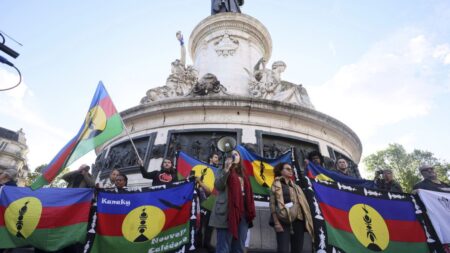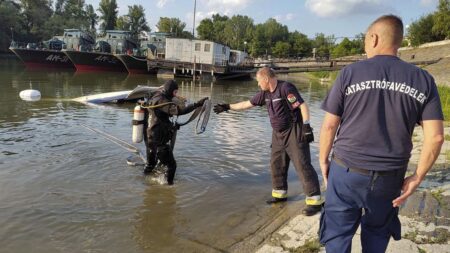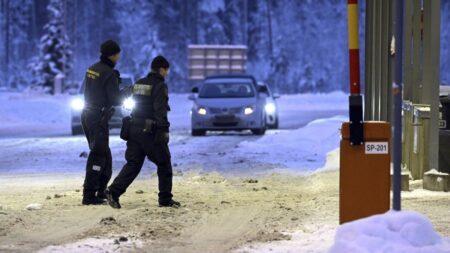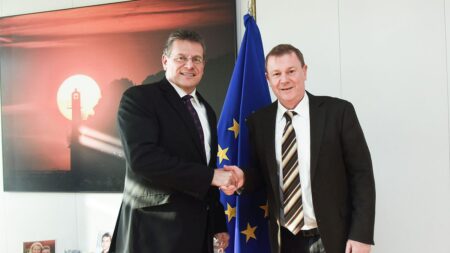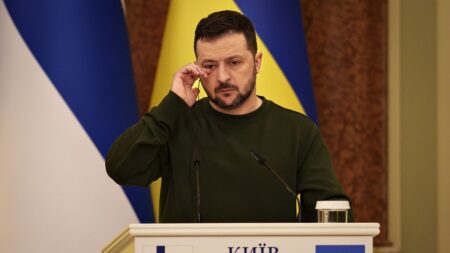Ukraine is the favourite candidate country to join the EU for European voters, an exclusive IPSOS/Euronews poll reveals but the bloc’s enlargement is not among citizens’ top priorities ahead of next June’s EU elections
Forty-five per cent of voters across the EU are in favour of Ukraine joining the bloc, while 35% are openly against it, and another 20% are in two minds about it, the Euronews/Ipsos poll carried out among 26,000 respondents across 18 member states has found.
The war-torn country and neighbouring Moldova put in their bid to become EU members within weeks of Russia launching its full-scale invasion of Ukraine in late February 2024 and acquired candidate status in record time. EU leaders have since also agreed to open negotiations talks.
Before the war, the prospect of Ukraine joining the bloc was considered remote as other countries in the Western Balkans had, by then, had their own bids stalled for years.
The results of the enlargement poll on a country-by-country basis suggest that the rather favourable opinion of the Europeans for Ukraine to join the EU is a mix of emotions, sympathy and political realism.
For instance, 68% of Finns want Ukraine to join the EU. Finland, which shares a border with Russia, has recently become a NATO member, discarding decades of neutrality in the process. Nordic strategists believe Ukraine’s gradual integration in the EU will eventually weaken the Russian capacity to interfere with the bloc’s Eastern neighbourhood.
They are followed by Portugal and Spain, where overwhelming majorities (68%) are also in favour of Ukraine joining.
Other Nordic countries including Sweden and Denmark as well as member states neighbouring Ukraine, such as Poland and Romania, are also enthusiastic at the prospect.
The member state that most opposes Ukraine’s accession is Hungary where 54% of respondents opposing such a move and only 18% in favour.
France, despite President Emmanuel Macron’s outright support for Ukraine against Russia, is also one of the member states where opposition to Ukraine’s accession is the strongest.
On a political party basis, Greens voters are the most favourable to opening the gates of the EU to Ukraine, followed by the centrist Grand Coalition electorate (EPP, Renews and S&D) and the nationalists of the European Conservatives and Reformers. The voters of the far-right Identity and Democracy group are openly against Ukraine with 64% in the oppose camp.
Selective security perceptions
But while Russia’s full-scale invasion of Ukraine, now in its third year, has injected fresh momentum in the enlargement process in Brussels and across capitals, voters are much less enthusiastic. Enlargement is not even among the 10 priorities they have identified for the coming plebiscite and next mandate.
And apart from Ukraine, a relative majority of EU voters don’t share the idea of their political leaders that other countries joining the Union would enhance the stability of Europe.
In this case the geographical and the political environment also matter. The Nordics’ favourable opinions drop dramatically, whereas the Central and the Southern European countries’ voters have disparate opinions.
Only 37% of the European voters support the accession of Bosnia and Herzegovina to the EU, 33% are against, and 30% have no opinion. The most in favour are Romanians (62%), but most Germans (40%) are against as are 50% of the French.
As for Georgia, those in favour and against weigh the same, 35% each, while another 30% don’t know. Georgia received candidate status last December and EU leaders have not yet approved the opening of negotiation talks.
Europeans are equally divided about Serbia’s membership with 37% against and 35% in favour. Romanians, again, are the most favourable while Germans, French and Dutch overwhelmingly oppose it.
The trend is the same for Albania with the against vote in the lead — 38% vs 34%.
Turkey is the least popular EU candidate for Europeans, the IPSOS poll found, with 55% of Europeans polled against. Only in Romania, Spain, Bulgaria, Portugal and Hungary does the approval vote come out stronger with respondents from the other member states coming out against.
Montenegro and North Macedonia are also candidate countries and have already started the negotiation process, but they were not included in the IPSOS/EURONEWS investigation.
Read the full article here



